英语人教版八年级上册Unit6 Reading
人教版八年级英语unit62B阅读课件
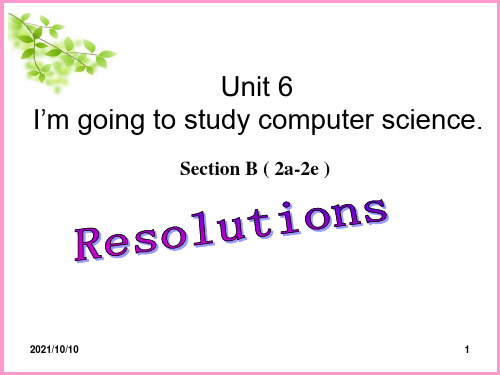
T
In your mind(心里),what’s your No.1 resolution?
( )Improve my relationships with my family and friends ( )Improve Physical health ( )How to do better at school ( )About my personal(个人的) improvement …
They are going to make a weekly plan for schoolw (T )or false (F)
( )1.It’s easy for people to keep the resolutions ( )2.Sometimes people just forget about the resolution
To________(讨论) the different kinds of resolutions
To _______(质疑) the idea of making resolutions
Para 1
Para 2
Read and match each paragraph(1—3) on 2c
Unit 6 I’m going to study computer science.
Section B ( 2a-2e )
His resolution is about
身体的
What are they going to do?
physical health
She’s going to the with her family
question
meaning
discuss
英语人教PEP版八年级(上册)Unit6SectionA(1a-2d)(共32张PPT)

H_s_ce_hio_so_lg_oainngd
to finish _h_ig_h_ college first.
2c Ask and answer questions A: What does Cheng Han want to be?
B: He wants to be a teacher.
A: When is Cheng Han going to start?
B: He is going to start when he finishes high school and college .
2d
Listen to the tape and find the answers to the questions.
course. What do you want to be?
keep on doing… 继续,坚持干…
be sure about… 对…有把握,确信…
Andy: My parents want me to be a doctor, but I’m not
sure about that.
try one’s best 尽最大努力
Unit6 Section A (1a-2d)
I am going to study computer science.
What is your dream job?
What do you want to be when you grow up?
想要成为
I want to be an actress.
Farmers grow us rice. Bakers make us bread. Artists draw us pictures. Postmen bring us letters. Teachers teach us English. Workers make us bags. Drivers drives us to places. Writers writes us books.
人教版英语八年级上册unit6 全单元课件
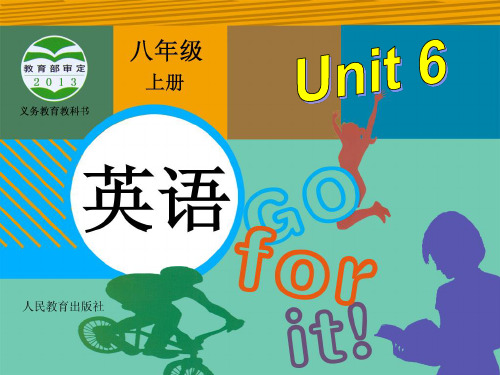
a doctor a cook
a pilot
Computer programmer
doctor
teacher driver
Jobs
cook reporter doctor
policeman singer
比一比谁反应更快
Step 5
Do you think these jobs are interesting? Rank them(1-12).
What do you want to be when you grow up? 长大
I want to be a basketball player.
I want to be a teacher. I want to be an actor.
1a Which job is the most interesting?
of course. What do you want to be? Andy: My parents want me to be a doctor, but I’m
not sure about that. Ken: Well, don’t worry. Not everyone knows what
an actor 演员
take acting lessons (上表演课)
1b
Listen and fill in the blanks. Then match the items.
1. computer programmer 2. basketball
player
3. engineer
a. take _a_c_t_in_g__ lessons
I want to be a basketball player.
人教版英语八年级(上)Unit6SectionB2a-2e课件

hobby
v.用颜料画;在……上刷油漆 /peɪnt/
paint
adj.&adv.每周的(地)/ 'wiːkli/ weekly
n.学校作业;功课 /'skuːlwɜː(r)k/ schoolwork
v. 表示疑问;怀疑;/'kwestʃən/ question
n. 意义;意思 /'miːnɪŋ/
例:我想把你刚才所说的写下来。 I want to write down what you just said.
关于Down的常用短语:
up and down 上上下下;往返地 walk/go down 沿着……走
sit down 坐下 go down 下降;下沉 put down 放下;平定;镇压
most common kind is New Year's resolutions. ___D_____
D.The start of the year is often a time for making resolutions
When we make resolutions at the beginning of the year, we hope that we are going to improve our lives. Some
Language points
1.It's a kind of promise. (1).promise在此处作可数名词,意为“承诺”。 常用短语:
make a/one’s promise 许下诺言 break a/one’s promise 违背诺言 keep a/one’s promise 信守诺言
3. Why do people usually make resolutions?
人教版八年级英语上册Unit6.Reading教学设计

3.教师强调关爱他人、参与社会公益活动的重要性,激发学生将所学知识运用到实际生活中的决心。
4.布置课后作业,要求学生结合本节课所学,写一篇关于自己参与公益活动的短文,以巩固课堂所学知识。
五、作业布置
1.完成课本练习册中与本节课相关的一般过去时练习题,旨在巩固学生对语法知识的掌握。
-短文要求至少80词,使用一般过去时描述过去的活动,或使用一般将来时表达未来的计划。
-注意文章结构的合理性,包括开头、经过和结尾。
4.收集身边的公益活动和志愿者服务信息,了解他们的宗旨和活动内容,下节课与同学分享。
-通过收集和分享,拓宽学生的视野,增强他们对社会公益活动的认识。
-鼓励学生积极参与到这些活动中,将所学知识付诸实践。
2.利用多媒体教学资源,如:图片、视频等,激发学生的学习兴趣,帮助学生更好地理解文本内容。
3.运用阅读策略,如:预测、扫描、推理等,引导学生深入理解文本,提高阅读效率。
4.创设真实的语言环境,让学生在实际情境中运用所学知识,提高学生的语言运用能力。
5.通过课后作业和拓展活动,巩固所学知识,培养学生的自主学习能力。
5.引导学生树立正确的价值观,认识到付出和奉献的重要性,激发他们为社会贡献自己的力量的决心。
本教学设计旨在通过本章节的学习,使学生在掌握英语知识与技能的同时,培养良好的情感态度和价值观,为他们的全面发展奠定基础。
二、学情分析
八年级学生经过前两年的英语学习,已经具备了一定的英语基础,包括词汇、语法和阅读能力。在此基础上,他们对英语学习具有一定的兴趣和热情,但个体差异仍然明显。一些学生在语言表达、阅读理解方面存在困难,需要教师在教学过程中给予关注和指导。
人教版八年级上册英语Unit6 - Unit10 作文讲解

人教版八年级上册英语Unit6 - Unit10 作文讲解Unit 6Topic:New Year’s ResolutionsNew Year’s Resolutions is coming. I'm going to make four resolutions for it.The first resolution is about my study. I'm going to study harder to get better grades.I am going to do my homework on time. If I meet some difficulties, I will ask my teachers for help. The second one is about my physical health. I'm going to get lots of exercise. For example, I can run three times a week. And I'm going to eat healthier food such as more fruit and vegetables. The third one is about my self-improvement.I'm going to take up a new hobby next year. I'm going to learn to sing. I think singing is a great activity. And it will make my family happy because they love to listen to music and sing together. As for the relationships with my family and friends, I'm going to spend more time with them and help them with housework or schoolwork.All in all, where there is a will, there is a way. As long as I try my best, I believe my resolutions can come true.Topic:life goals主要是谈论个人理想及未来的打算。
人教版八年级英语上册Unit6.Reading优秀教学案例
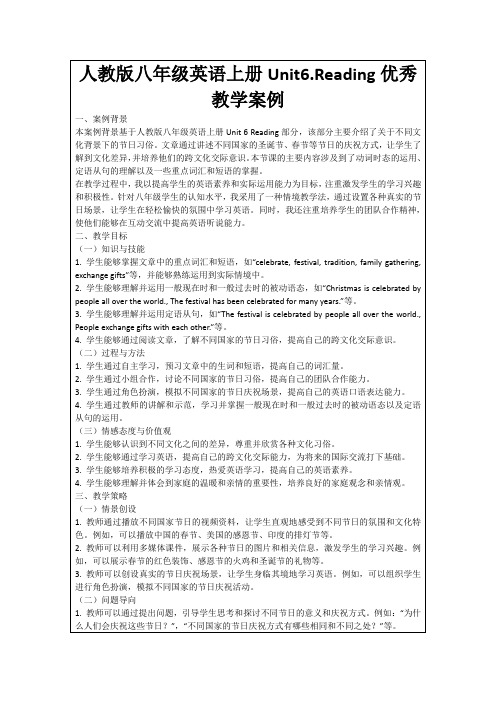
1.教师可以根据学生的兴趣和特长,将学生分成不同的小组,鼓励他们合作完成各种任务。例如,每个小组可以选择一个国家,研究和介绍该国家的节日习俗。
2.教师可以组织学生进行小组讨论和交流,促进他们互相学习和提高。例如,学生可以互相分享自己过节的经历和感受,共同讨论如何用英语表达。
(四)反思与评价
(四)总结归纳
1.教师可以邀请每个小组分享他们的研究成果,让学生在交流中学习和借鉴。
2.教师可以总结和归纳文章中的重点内容,如节日习俗、动词时态、定语从句等,帮助学生巩固所学知识。
3.教师可以强调跨文化交际的重要性,鼓励学生尊重和欣赏各种文化差异。
(五)作业小结
1.教师可以布置一道相关的作业,让学生进一步巩固所学知识,如写一篇关于某个节日的短文。
(三)情感态度与价值观
1.学生能够认识到不同文化之间的差异,尊重并欣赏各种文化习俗。
2.学生能够通过学习英语,提高自己的跨文化交际能力,为将来的国际交流打下基础。
3.学生能够培养积极的学习态度,热爱英语学习,提高自己的英语素养。
4.学生能够理解并体会到家庭的温暖和亲情的重要性,培养良好的家庭观念和亲情观。
3.学生能够理解并运用定语从句,如“The festival is celebrated by people all over the world., People exchange gifts with each other.”等。
4.学生能够通过阅读文章,了解不同国家的节日习俗,提高自己的跨文化交际意识。
在教学过程中,我以提高学生的英语素养和实际运用能力为目标,注重激发学生的学习兴趣和积极性。针对八年级学生的认知水平,我采用了一种情境教学法,通过设置各种真实的节日场景,让学生在轻松愉快的氛围中学习英语。同时,我还注重培养学生的团队合作精神,使他们能够在互动交流中提高英语听说能力。
人教版八年级上册英语Unit 6 全单元.教学设计

Unit 6 I’m going to study computer science.Section A 1 (1a-2d)一、教学目标:1. 语言知识目标:1) 能掌握以下单词:grow up, computer programmer, cook, doctor, engineer,violinist, driver, pilot, pianist, scientist, be sure about, makesure能掌握以下句型:①─What do you want to be when you grow up?─I want to be a basketball player.②─How are you going to do that?─I’m going to practice basketball every day.③ Where are you going to work?④ When are you going to start?⑤I’m not sure about that.2) 能了解以下语法:掌握一般将来时态的构成形式;3) 用一般将来时态表达将要做的事情。
2. 情感态度价值观目标:每个人都有自己的梦想和对未来的打算,对于将来想要从事的职业也充满了憧憬。
人们以常谈论他们的设想,因此,应通过学习这单元的内容来激发学生们的学习主动性和学习兴趣,使他们更加有理想,并为实现自己的理想而不断努力。
二、教学重难点1. 教学重点:1) 学习一般将来时态的构成方式。
2) 学习本课时出现的重点句型,通过在不同情景下运用来熟练运用一般将来时态。
2. 教学难点:用一般将来时态表达自己未来的打算。
三、教学过程Ⅰ. RevisionⅡ. Warming up1. 介绍自己小时候想要从事的职业,由此归纳出以前所学过的一些职业的英语表达方式:teacher, nurse, doctor, basketball player, runner, actor, actress…2. 询问学生们想要从事的职业,从而引出句型:─ What do you want to be when you grow up?─ I want to be a basketball player.3. 学生们看幻灯片,引导学生们进行问答自己将来所喜欢的职业。
【人教版】新目标八年级英语上册:Unit6单元说课稿

【人教版】新目标八年级英语上册:Unit6单元说课稿一. 教材分析人教版新目标八年级英语上册Unit6主要围绕着“节日”这一主题展开,通过学习本单元,学生能够掌握关于节日的词汇和表达方式,了解不同国家的节日习俗,提高自己的跨文化交际能力。
教材内容丰富,包括主课文、语法、听说、读写等多个部分,旨在全面提升学生的英语综合运用能力。
二. 学情分析八年级的学生已经具备了一定的英语基础,对于学习新的词汇和表达方式有一定的掌握。
但同时,学生在语法、听说、读写等方面的能力参差不齐,需要针对性地进行教学设计。
此外,学生对于不同国家的文化背景了解有限,需要通过课堂拓展来提高他们的跨文化交际意识。
三. 说教学目标1.知识目标:学生能够掌握关于节日的词汇和表达方式,了解不同国家的节日习俗。
2.能力目标:学生能够运用所学知识进行简单的跨文化交际,提高自己的英语口语表达能力。
3.情感目标:培养学生对不同文化的尊重和理解,拓宽国际视野。
四. 说教学重难点1.重点:掌握关于节日的词汇和表达方式,了解不同国家的节日习俗。
2.难点:运用所学知识进行实际的跨文化交际,提高英语口语表达能力。
五. 说教学方法与手段1.交际法:通过模拟真实场景,让学生在实际语境中运用所学知识进行交流。
2.任务型教学法:通过完成各种任务,激发学生的学习兴趣,提高他们的实践能力。
3.多媒体教学手段:运用PPT、视频等教学辅助材料,丰富课堂形式,提高学生的学习积极性。
六. 说教学过程1.导入:以一段关于节日的视频导入,激发学生的学习兴趣,同时引导学生思考:你们知道哪些节日?最喜欢哪个节日?2.新课呈现:通过PPT展示本节课的主要内容,包括节日词汇和表达方式,不同国家的节日习俗等。
3.课堂实践:模拟真实场景,让学生分组进行角色扮演,运用所学知识进行跨文化交际。
4.语法讲解:针对本节课的语法点,进行详细的讲解和示例,让学生在理解的基础上进行运用。
5.听力训练:播放一段关于节日的听力材料,学生听后进行问答,检查学生对听力材料的理解程度。
人教版英语八年级上册Unit 6 说课稿
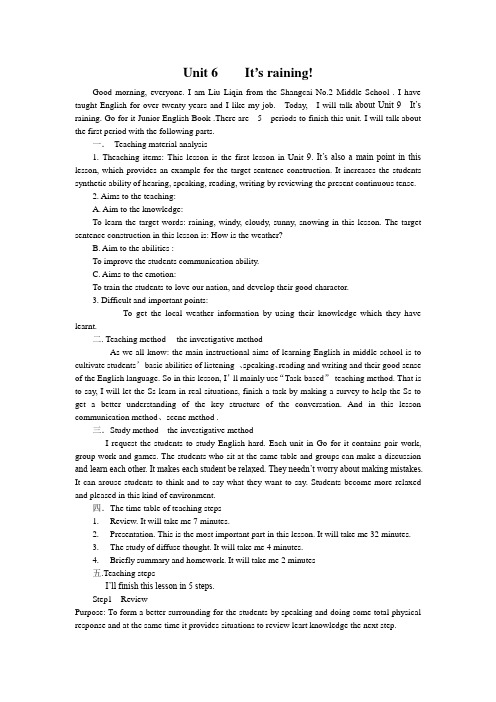
Unit 6 It’s raining!Good morning, everyone. I am Liu Liqin from the Shangcai No.2 Middle School . I have taught English for over twenty years and I like my job. Today, I will talk about Unit 9 It’s raining. Go for it Junior English Book .There are 5 periods to finish this unit. I will talk about the first period with the following parts.一.Teaching material analysis1. Theaching items: This lesson is the first lesson in Unit 9. It’s also a main point in this lesson, which provides an example for the target sentence construction. It increases the students synthetic ability of hearing, speaking, reading, writing by reviewing the present continuous tense.2. Aims to the teaching:A. Aim to the knowledge:To learn the target words: raining, windy, cloudy, sunny, snowing in this lesson. The target sentence construction in this lesson is: How is the weather?B. Aim to the abilities :To improve the students communication ability.C. Aims to the emotion:To train the students to love our nation, and develop their good charactor.3. Difficult and important points:To get the local weather information by using their knowledge which they have learnt.二. Teaching method--- the investigative methodAs we all know: the main instructional aims of learning English in middle school is to cultivate students’basic abilities of listening 、speaking、reading and writing and their good sense of the English language. So in this lesson, I’ll mainly use“Task-based”teaching method. That is to say, I will let the Ss learn in real situations, finish a task by making a survey to help the Ss to get a better understanding of the key structure of the conversation. And in this lesson communication method、scene method .三.Study method---the investigative methodI request the students to study English hard. Each unit in Go for it contains pair work, group work and games. The students who sit at the same table and groups can make a discussion and learn each other. It makes each student be relaxed. They needn’t worry about making mistakes. It can arouse students to think and to say what they want to say. Students become more relaxed and pleased in this kind of environment.四.The time table of teaching steps1. Review. It will take me 7 minutes.2. Presentation. This is the most important part in this lesson. It will take me 32 minutes.3. The study of diffuse thought. It will take me 4 minutes.4. Briefly summary and homework. It will take me 2 minutes五.Teaching stepsI’ll finish this lesson in 5 steps.Step1---ReviewPurpose: To form a better surrounding for the students by speaking and doing some total physical response and at the same time it provides situations to review leart knowledge the next step.1. Let a student greet and make a duty report.2. Free talk between T and Ss about last unit.3. Review the present continuous tense by software.I will make a conversion with the students . I ask students to answer .th e questions:“ What is he doing?” Students answer:“ He is singing.” The second picture,“ What are they doing?” “They are playing chess.”And then I will let the students ask and answe r in pairs using the target sentences “What is he doing?”“What is she doing?”“What are they doing?”. Make sure the students ask and answer correctly. They can use the words: dance、go to school、swim、play computer games、paint、watch TV and run.Step2---PresentationThe purpose is to present the key words one by one. It is much easier for the students to learn and grasp the meaning. CAI provides a real situation for students to understand the conversation better.I’ll mainly talk about this step.1. I’ll use a picture to ask a question: “Is it raining?” Ss answer:”Yes,it is.” Then I’ll tell them if you want to know the weather, you can ask:“How is the weather?” The answer is:“It’s raining.” “raining ”is a target word and “How is the weather?” is a target sentence. Help the Ss understand the meaning by body language. Then lead the Ss to read the sentences. Make sure they can say them out correctly.I will use the other pictures to teach the target words “windy 、cloudy、sunny and snowing”.2.I will use the other pictures to teach the other target words“ windy, sunny, cloudy and snowing.”These are the sentences they must master. “How is the weather?” “It’s cloudy”. “It’s windy.” “It’s sunny.” “It’s snowing.” and “It’s raining.”3. After they finish learning the target words. I will ask them to open the books and turn to P53. I will teach 1aThis activity introduces the key words.After they finish it, I will give them the right answers.4. We will do listening exercise 1bThis activity gives students practice in understanding the target language in spoken English.The students can listen twice and finish them.5. 1c pairwork.This activity provides guided oral practice using the target language.Ask the students to make a conversation in pairs according to the model.6. After they finish it, we will go on listening exercises. Look at Page 54-2a.At first I will point to the four pictures. Ask students to tell what each person is doing in each picture. For example: “The boy is talking on the phone”. “The man is playing basket ball.”and so on. Then I will play the tape twice and the Ss number the pictures. I will give them the right answers.7. Go on learn ing 2b. It’s listening exercise s,too.I will ask a student to read the list of names and another student read the list of activities for the class. Then play the tape twice. The students listen and match the names and the activities. After they finish it, I will give them the correct answers.8. 2c-Pairwork.I will ask Ss to make conversations in pairs, I’ll ask some pairs to presen t their conversations to the class.9. After learning the text. I will let Ss do some more oral exercises.This is a weather report. I’ll let the students make a conversation in pairs with the weather information using the target words and sentences.It is sunny/rainy…….Step 3. The study of diffuse thought.Purpose: In order to raise students English level, I will teach them word-building --how to change nouns into adjectives. It can help them improve the abilities of remembering words easily. The words are sun–sunny, snow–snowy, wind-windy, rain-rainy, cloud-cloudy.Step 4. Summary and homework.Purpose: It’s important for students to speak English as much as pos sible in class or after class. It’s ne cessary for them to do some exercise after class to consolidate the knowledge they learned.In this lesson, We have learnt some words and sentences about the weather .Ss can use these to ask and answer about local weather information.Homework for this lesson is:1) Finish off the workbook.2) Listen to the local weather report and get ready for the conversation for tomorrow.3) Remember the target words and sentences by heart.Design of blackboardUnit 9 It’s raining!How’s the weather? ---It’s raining/rainy.---It’s sunny.---It’s cloudy.---It’s windy.--- It’s snowing/snowy.What’s he/she doing? ---He’s/she’s……What’re they doing? ---They’re ……。
Unit+6(Period+5)+Section+B2023-2024学年人教版英语八年级上册

能够做某事_b_e_a_b_l_e_t_o_d_o__s_th_.__
关于;与……有关系_h_a_v_e_t_o_d_o__w_i_th
成为足球队的一员_m_a_k_e__th_e__so_c_c_e_r_t_e_am__ 多进行体育锻炼 g_e_t_l_o_t_s _o_f_e_x_e_rc_i_s_e_
上表演课_t_a_k_e_a_c_ti_n_g_l_e_s_so_n_s__
继续做_k_e_e_p__o_n_d_o_i_n_g____
素材积累
2.句型积累
(1)我想成为一名作家,因为我喜欢读故事书。 _I_a_m__g_o_in_g__to__b_e_a__w_r_it_e_r_b_e_c_a_u_se__I_l_ik_e_r_e_a_d_in_g__s_to_r_y_b_o_o_k_s_. _________
审题
在新年来临之际,制定新年计划对于提高和完善自我有着重要 的意义。请根据表格内容,写一篇英语短文,介绍一下 Kathy 一 家的新年计划。
父亲 加强锻炼;读更多的书;挣更多的钱 母亲 学跳舞;学做更多美味的饭菜 Kathy 更加努力地学习;继续练习弹钢琴 弟弟 少吃垃圾食品;和同学处好关系
要求: 1.语意连贯,逻辑合理,可适当发挥; 2.70词左右(开头已给出,不计入总词数)。
(2)我打算多锻炼少吃垃圾食品。 _I’_m__g_o_i_n_g_t_o_e_x_e_r_c_is_e_m__o_re__a_n_d_e_a_t_l_es_s__ju_n_k__fo_o_d_.__________________
(3)成为一名医生不容易,为此我制订了计划。 _It_’_s _n_o_t_e_a_sy__to__b_e_c_o_m_e__a_d_o_c_to_r_,_s_o_I_m__a_k_e_a__p_la_n__fo_r_i_t_. _____________
英语八年级上册-Unit6课件(含答案)
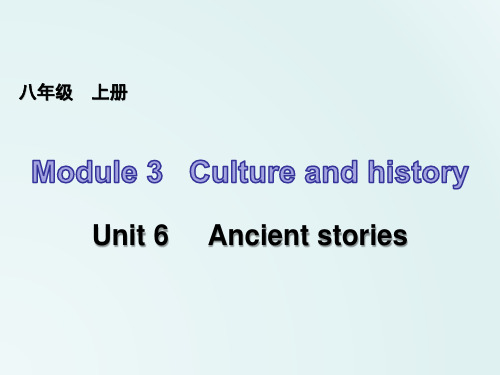
away together.
A. very small
B. very big
C. very high
( B ) 8.—What is the film about?
—The film is about a famous ancieቤተ መጻሕፍቲ ባይዱt story.
A. modern
B. old
C.interesting
八年级 上册
Unit 6 Ancient stories
第1课时 Vocabulary
一、根据句意及首字母或中文提示完成单词 1. We can learn a lot from a_n_c_ie_n_t____ stories. 2. Let's find out the d_if_fe_r_e_n_c_e_s___ between the two pictures. 3. There is a h_u_g_e______ stone over there. 4. The age is a se_c_r_e_t_____ to a woman. 5. They e_n_te_r_e_d____ the room just now. 6. We should _u_n_d_e_r_s_t_a_n_d_(理解)others' feelings.
6. If you want to have much _____s_u_c_c_e_s_s__ (succeed), you should not give up. 7. You will get __p_u_n_i_s_h_m__e_n_t _/ _p_u_n_i_s_h_e_d___ (punish) if you are careless. 8. They looked everywhere to find the __s_t_o_le_n_______ (steal) horse. 9. The speech made by Professor Zhang yesterday ____m__a_in_l_y____ (main) told us how to be confident. 10. Look! The bag is __f_u_l_l _ (fully) of storybooks.
人教版英语八年级上册unit1--6单元课文完形填空习题含答案
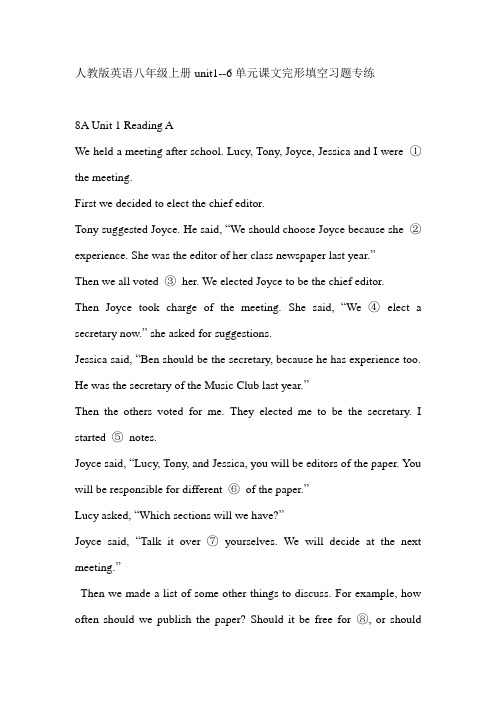
人教版英语八年级上册unit1--6单元课文完形填空习题专练8A Unit 1 Reading AWe held a meeting after school. Lucy, Tony, Joyce, Jessica and I were①the meeting.First we decided to elect the chief editor.Tony suggested Joyce. He said, “We should choose Joyce because she②experience. She was the editor of her class newspaper last year.”Then we all voted③her. We elected Joyce to be the chief editor.Then Joyce took charge of the meeting. She said, “We④elect a secretary now.” she asked for suggestions.Jessica said, “Ben should be the secretary, because he has experience too. He was the secretary of the Music Club last year.”Then the others voted for me. They elected me to be the secretary. I started⑤notes.Joyce said, “Lucy, Tony, and Jessica, you will be editors of the paper. You will be responsible for different⑥of the paper.”Lucy asked, “Which sections will we have?”Joyce said, “Talk it over⑦yourselves. We will decide at the next meeting.”Then we made a list of some other things to discuss. For example, how often should we publish the paper? Should it be free for⑧, or shouldthey pay for it? What should we call it?We considered the last question quickly. Lucy said, “We ought to⑨it the Mayfield Sun.”“What about the Mayfield Mirror or the Mayfield Star?” Jessica said. Because we all had different ideas, Joyce said, “We would think about this a bit⑩. We will make a decision about the name at the next meeting.”We agreed to conclude the meeting then. We arranged to have the next meeting in one week’s time.()①A. in B. on C. at()②A. have B. has C. had()③A. to B. by C. for()④A. ought to B. need C. must()⑤A. take B. took C. taking()⑥A. sections B. parts C. kinds()⑦A. to B. between C. among()⑧A. students B. teachers C. readers()⑨A. name B. call C. named()⑩A. time B. long C. longer8A unit 1 答案Key: CBCACACCBC8A Unit 1 listening BLast week was a very interesting week.Last Monday, our new music room opened. We have many new instruments and a lot of equipments. It opened with a special concert. The concert included a①and several songs. The school band played many of my favourite songs,②Hey Jude by the Beatles. Many students came to the concert with their parents. Everyone enjoyed the evening.Last Thursday evening, the photo club showed some old photos of Guangzhou③. These photos belonged to a student’s mother. Last Saturday, the club also had the members take photos of the same places as ④in the old photos. It is very interesting to see⑤the places have changed.Last Sunday, our school’s⑥volleyball team played and won their last game. Congratulations everyone! The other team from No.7 Middle School, played very well, but in the end they lost the game. Many⑦fans from both schools watched the game.()①A. play B. game C. match()②A. including B. such as C. for example()③A. in the 1950 B. in 1950s C. in the 1950s()④A. this B. these C. those()⑤A. / B. how C. what()⑥A. girl B. girl’s C. girls’()⑦A. big B. excited C. crazyKey: AACCBCB8A Unit 1 More Practice AZhen Hui was outside the English teacher’s room. She loves English very much. She wanted to discuss①English exercise with her English teacher. She looked a little②nervous.Li Ming left his bag in the playground and he walked back there to③it. When he found it, he looked quite happy.After school, Wang Gang rode out of the school④. He and his best friends planned to go to the cinema. He looked excited.Li Ye felt sick. He went to the⑤. The nurse told him to⑥his mother because he had a high⑦.Sally likes⑧books. She often borrows many books from the school library. She was on her way to the library to return the books.At break, Jia Ming ran to the sports field to play football with his classmates. They⑨practice a lot because they have a match with Class 2 next Wednesday.()①A. a B. an C. the()②A. bit B. more C. /()③A. get B. find C. save()④A. / B. door C. gate()⑤A. clinic B. hospital C. restaurant()⑥A. call B. ask C. phone()⑦A. ill B. sick C. fever()⑧A. read B. to read C. reading()⑨A. need B. have to C. mustKey: BAACACCBB8A Unit 2 Reading ALucy Mr Ken, Why do you like working as a detective?Ken I hope to protect the innocent①find the guilty. Well, let me tell you about a recent case. Mr Li is a rich man. He lives aloneand enjoys②things. He bought a vase③two million dollarsand only showed it to his friends Jill and Jenny. Then he lockedit in the safe inside his house. That night someone stole it, Lireported the④, and I went to his house to look for clues.Lucy Did you find any?Ken Yes, a black pearl earring near the⑤safe. Outside the open window, I also saw a lot of mud on the wet ground. Inside theroom, the carpet was very clean. Then I questions Jill and Jenny.They⑥denied stealing the vase, but I notice Jill wearing ablack pearl necklace. It has the same design as the earring. Luck So Jill was the thief?Ken I wasn’t sure. I needed proof. I showed Jill the earring. She admitted, “I t’s⑦. But someone stole it⑧my house a weekago.” I checked her story. It was true.Lucy I see, so Jill was no longer a suspect. However, what about your⑨clues—the mud outside and the clean carpet inside?Ken They only⑩one thing—no thief broke into Li’s house. So I questioned Li and, in the end, he admitted stealing his own vase.He said, “I bought insurance for the vase. I stole it for theinsurance money.”Li also stole Jill’s earring. He wanted tomake Jill go to jean instead of himself.Lucy Is Li behind bars now?Ken Yes, and Jill is free.()①A. and B. also C. as well as()②A. collect B. to collect C. collecting()③A. for B. about C. more than()④A. thief B. theft C. robbery()⑤A. open B. opened C. opening()⑥A. are B. both C. all()⑦A. me B. my C. mine()⑧A. in B. from C. inside()⑨A. other B. another C. the other()⑩A. mean B. meant C. meaningKey: CCABABCBAB8A Unit 2 Listening BI wanted to see Jill again, so on my way home①work, I stopped at a telephone box and called her. I invited her to the cinema②evening. She agreed to go with me, so we arranged to meet outside the cinema at seven o’clock.At around quarter past six, I put on my jacket and hat and left the house. I locked the door, but I③to turn off the light in the living room.At that time of day, it is very difficult to④a taxi. I could not find one, so I took the bus⑤. I arrived at the cinema around ten minutes early. Next to the cinema is a bookshop, so I went in to look around⑥I waited for Jill. I started reading a book about world-fames crimes. It was really interesting! In fact, it was so interesting⑦I forgot the time. I was late.When I arrived, Jill was really angry. She refused to speak to me at first. How could I make her happy? “I know!” I thought. “I will buy her some ⑧.” I went to the sweet shop and bought a large bar of chocolate. I was right—it did make her happy, and we went in to see the film.()①A. to B. for C. from()②A. in B. at C. that()③A. forget B. forgot C. remember()④A. get B. take C. have()⑤A. instead B. instead of C. to instead()⑥A. / B. when C. while()⑦A. so B. that C. lead to()⑧A. roses B. toys C. chocolateKey: CCBAACBC8A Unit 2 More Practice AYesterday was a very busy day. I solved two cases. The first case was about a bank robbery. A man entered a bank in the city centre with a gun. He took away thousands of①. The bank manager called the police, but it was too late. The robber②away. The suspect in the case was Tim Smith. At first, Tim denied③the robber. He said he was watching a film in the cinema at the time of the robbery. However, I had proof. One of the customers in the bank at that time took a photo. It showed Tim Smith in the bank,④ a gun. I showed the photo to Tim. He⑤admitted his crime.In the second case, a lady called Susan Brown bought a beautiful vase forfifty thousand dollars. The owner of the shop called the police because Susan had used⑥banknotes to pay for the vase. We⑦her to the police station. She said that she got the notes from the bank and that the bank clerk must have⑧her. However, when I searched her flat, I found half a million dollars in forged notes. She kept them in a safe in the wall. Susan then admitted printing the notes herself. I returned the beautiful vase to the shop.()①A. money B. yuans C. dollars()②A. run B. went C. got()③A. making B. being C. having()④A. carry B. carried C. carrying()⑤A. then B. had to C. still()⑥A. forget B. forgot C. forged()⑦A. took B. brought C. called()⑧A. fooled B. joked C. jokingKey: CCBCACBA8A Unit 3 Reading AHidden helpersNot so many years ago, you hardly①saw computers. Now they seem to be everywhere.There are also many hidden “computers” in your home, but you②be unaware of them. For example, there may be one inside your TV set, telephone or washing machine.You are more③on computers than you know.What kind of jobs can a computer do?Computers are probably the best calculators in the world. They are faster ④calculating than people, and they rarely give wrong answers. They can also type, print and draw things like diagrams and graphs. They can teach you many things and also play games with you. More⑤, they can operate railways (⑥the underground) and fly planes and spaceships. For⑦reasons, we sometimes call them “electronic brains”.Is a computer cleverer than I am?The answer to this question is, for the time being, “No”. You have⑧understanding of the meaning of things than computers and can also create new ideas of you own. However, one day computers may be able to do⑨things than a human brain. In the future, they may even be better at doing their jobs than doctors, judges and teachers.This raises interesting questions. How⑩computers change our lives? Will we have nothing to do? Will computers make our lives better or worse in the future?()①A. / B. ever C. even()②A. should B. may C. might()③A. dependent B. interested C. enjoy()④A. in B. on C. at()⑤A. important B . importantly C. useful()⑥A. / B. like C. such as()⑦A. that B. this C. these()⑧A. great B. greater C. greatly()⑨A. more B. many C. much()⑩A. will B. can C. couldKey: BCACBBCBAA8A Unit 3 Reading BHow do we give computer instructions?We give a computer instructions①putting different programs into it. “Computer programmers” write computer programs. It is essential for②people not to make mistakes.③, the computer will not work well.A computer needs different programs to do different④. For example, playing games, writing letters and drawing pictures all need different programs. There are also different languages for different programs.⑤a program, people need to know this language. Sometimes a computer programmer may know many different languages.⑥, computer languages are not spoken languages like Chinese or English⑦writtenlanguages. Also, only the computer and the programmer can understand them!CD-ROMs and DVE-ROMsMany computers have CD-ROM or DVD-ROM⑧. A CD-ROM can hold over 300,000 pages of writing, and may also contain pictures and sounds. A DVD-ROM can hold even more⑨. So, you can use them on you computer to read about the most famous people in the world today. You can also see photographs⑩videos of people, and even listen to them speaking. According to some people, CD-ROMs and DVD-ROMs will become even more popular than books.()①A. by B. with C. in()②A. the B. this C. these()③A. In fact B. However C. Otherwise()④A. things B. jobs C, work()⑤A. Write B. To write C. Writing()⑥A. In fact B. However C. Otherwise()⑦A. but B. it’s C. so()⑧A. / B. driver C. drives()⑨A. letters B. words C. information()⑩A. or B. and C. /Key: ACCBBBACCA8A Unit 3 More Practice BA research team in the USA first had the idea of①computers together in the 1960s. They wanted computers in universities, research departments and the military to communicate with ②and share information. At that time, computers were bigger than fridges. People could not move them③. Computers were also complicated and difficult to use.Slowly, more and more people started to link their computers together. Then businessmen started to use the Internet④. Today, people all over the world are⑤the Internet.There is a wide range of services on the Internet. For example, we can use it to communicate with other people. The most popular way to communicate is through electronic mail, or “e-mail”. We can also use services such as MSN messenger⑥Skype. We can use these services to send instant messages to people near of far away.The Internet⑦us to use to World Wide Web (also⑧as WWW or the Web). The web is many connected pages of information. We can use the Web to read news and learn about our favourite sports stars or singers. The Internet⑨changed our lives. Now we can contact the whole world with the computers⑩our homes.()①A. link B. linked C. linking()②A. each other B. the others C. the other()③A. easy B. easily C. easier()④A. too B. also C. as well()⑤A. use B. used C. using()⑥A. or B. and C. with()⑦A. allow B. allows C. allowing()⑧A. called B. named C. known()⑨A. have B. haven C. has()⑩A. in B. on C. atKey: CABACABCCA8A Unit 4 Listening BGood evening, everyone. Welcome to “History①a minute”. Tonight, we are going to talk about the ancient Olympic Games.The first Olympic Games②thousands of years ago in Greece. People started the Olympic Games to③respect to the gods. They would pray to their gods in the morning and then have the games in the afternoon. The first Olympic Games only④for one day! In modern times, the Olympic Games last for two weeks. In the modern Olympics, we have many different kinds of sports, but in the ancient Olympic Games, there were only⑤ten kinds of sports.One last fact—thousands of years ago,⑥women could not watch the games.⑦, they would be punished! Here is a story about a woman at the ancient Olympic Games in Greece. Her name was Helen. Helen’s son Rodus⑧the competition of running in the Olympic Games. Helen wanted to watch Rodus run, so she made herself⑨like a soldier and entered the stadium. Unfortunately, Helen was found inside the stadium. Rodus won the⑩, but his mother was punished.()①A. in B. for C. with()②A. started B. began C. happened()③A. show B. showed C. showing()④A. last B. lasts C. lasted()⑤A. about B. less than C. more than()⑥A. marry B. married C. marrying()⑦A. Or B. However C. Otherwise()⑧A. join B. join in C. took part in()⑨A. like B. looks C. looked()⑩A. competition B. match C. gameKey: BCACABCCAA8A Unit 4 More Practice BReligion was very important to the ancient Greeks. In①opinion, itwould make their lives better and also the gods and goddesses would take care of them after they②.The Greeks believed in many different gods and③. These gods and goddesses controlled everything in their④and the environment. It was important to make them happy—happy gods and goddesses helped you, but unhappy⑤punished you.Zeus is the⑥of the Greek gods. Zeus is lord of the sky, and the god of rain. Zeus is married to Hera. She is the goddess of marriage and childbirth. Poseidon is the brother⑦f Zeus. He is the god of the sea. Aphrodite is the goddess of love and⑧. Aphrodite rises from the waves of the sea. She makes everyone⑨love.There are also gods and goddesses of the home, of war, of music, of the city and of fire. The Greeks held many festivals to show respect to them. They⑩temples to be the gods and goddesses’homes. People prayed and gave gifts to the gods and goddesses to make their wishes come true—for a good harvest, or for a good journey, or for their children to become beautiful.()①A. my B. his C. their()②A. die B. died C. death()③A. godess B. goddess C. goddesses()④A. life B. live C. lives()⑤A. one B. ones C. once()⑥A. ruler B. king C. queen()⑦A. on B. to C. of()⑧A. beauty B. beautiful C. beautied()⑨A. feel B. fall C. fell()⑩A. build B. built C. buildedKey: CBCCBACAAB8A Unit 5 Reading BIn 1904, Mrs Bess clarke of Washington State, the USA, saw a long, dark tree trunk in a lake. As she moved①, she saw the trunk②in the water. It looked very③. Mrs Clarke described seeing a strange creature. It was black in colour, with a head in the shape of a triangle, round eyes, and a long tail. Based④her description, scientists regarded it as a kind of sea dinosaur, they called it Bess.Since then, many people saw Bess in the⑤lake. They described Bess as a dark, snake-like creature with a long tail. John Lee has studied strange creatures and monsters⑥. In 1990, he set up a video camera near the lake to try to film Bess. One morning john saw the creature swimming near the surface of the lake. The creature appeared suddenly ⑦of the water and had the same appearance as the one nearly 100 years ago. John Lee took a film that day. It showed a creature about 100 metreslong with a very small head.In 1992, Ron Smith reported⑧Bess and three other similar creatures in the same lake. The bodies of the three other creatures were⑨different. They seemed to be another kind of sea creature.According to Dr David Dino, the world-famous expert on strange creatures, it is possible that sea monsters are living in many great lakes ⑩the world.()①A. near B. close C. closer()②A. moving B. moved C. move()③A. frightening B. frightened C. frighten()④A. in B. on C. at()⑤A. / B. same C. different()⑥A. his life B. his live C. all his life()⑦A. out B. went out C. inside()⑧A. see B. saw C. seeing()⑨A. very B. quite C. quiet()⑩A. in B. all C. aroundKey: CAABBCACBC8A Unit 5 More Practice ASally felt frightened when she saw a huge, dead monster on the①inAustralia. It was hairy and very smelly. “It was horrible,” said Sally. “It was in the shape of a tree trunk, and it looked like a monster.” Nobody ②what the monster was.Do you believe that dragons exist? Nobody has③seen a dragon, but there are still many drawings of dragons④the world. They have wings and sharp claws, and they breathe fire. Dragons represent different things in different cultures.⑤, the Chinese dragon lives in the sky and⑥all the water on Earth. One type of dragon lives in the sky and controls all the water on Earth. One type of dragon really does exist and⑦is the Sea Dragon. It is found in the seas of Australia it is about 45 centimetres long. There is a strange thing about this creature—the males⑧the babies. Some males live for more than twenty years and give birth twice a year.Have you ever seen a jellyfish? There is one type of jellyfish called the Sea Wasp. It looks like a harmless sea creature. It has no head, no brain and is 99% water. However, its sting can kill. If you get stung by one of these⑨, you have four minutes to get help, or die!()①A. beach B. road C. lake()②A. know B. knows C. knew()③A. been B. ever C. even()④A. in B. all C. around()⑤A. However B. Otherwise C. For example()⑥A. controls B. controlled C. controlling()⑦A. it B. that C. /()⑧A. give B. gave C. have()⑨A. creature B. dragon C. monsterKey: ABBCCABCA8A Unit 6 Reading AWang Damin sits on the side of the river. He is cooking①, with a large bird on his head. The bird is a cormorant, and Damin is a②. He is over 60 now but still works every day and is still③to control his raft on the river. He lives and works with his cormorants on this river. Cormorants are large black birds, about a metre long. They are good at ④fish because they can swim⑤⑥water. Their large feet are used to push them quickly through the water.Damin does not require nets to catch fish. That is done for him by his twelve cormorants. Damin begins his work on his bamboo⑦with his birds in the late afternoon. The birds swim down and catch fish. A piece of grass is tied around the neck of each bird, so it cannot swallow the fish. They⑧the fish back to the raft. The fish are then removed from the birds’ mouths and thrown into a big basket by Damin. At night, a light is hung from the front of the raft.⑨helps Damin see better, and alsoattracts the fish. Later, some of the fish are sold, and the rest are divided between Damin’s family and the cormorants.Cormorant fishing is a⑩Chinese skill. However, few young people are interested in doing his type of work any more. Modern fishing methods are now widely used.In 50 years, perhaps cormorant fishermen will no longer exist in the world.()①A. meal B. a meal C. dinner()②A. fish B. fisher C. fisherman()③A. enough strong B. strong enough C. strongly()④A. catch B. catches C. catching()⑤A. well B. good C. nice()⑥A. in B. under C. inside()⑦A. raft B. boat C. ship()⑧A. take B. took C. bring()⑨A. It B. This C. That()⑩A. tradition B. traditional C. customsKey: BCBCABACBB8A Unit 6 More Practice AOur company is①a new scientist to join our busy team.About us: We are international company and we are②different types of paint. We hope to create a paint that dries very quickly and has no③smell. If we successful, we will sell this paint around the world.About you: You must have experience④working in a laboratory. You must have the experience of working with⑤.Our laboratory often has a bad smell. It is also very noise. You must be able to work well in this difficult environment. You need to work calmly and not get excited or⑥when there is a lot of work to do. You must have a good sense of humour and⑦g telling jokes. You must have the ability to work alone and also as part of a team.We are looking for a very⑧t person. You need to be able to work quickly and correctly. There is a lot of paperwork. You must like writing reports and be⑨expert in computer technology.The job requires you to travel a lot and sometimes work in the evening and at weekends.If you think you are the right person for the job, contact us today!()①A. looking for B. looking to C. looking forward()②A. research for B. researching for C. researching()③A. pleasant B. unpleasant C. uncomfortable()④A. in B. on C. at()⑤A. print B. paint C. printing()⑥A. sad B. unset C. sadly()⑦A. enjoy B. enjoys C. enjoying ()⑧A. efficient B. interested C. excited ()⑨A. a B. an C. theKey: ACBCBBCAB。
人教版八年级上册英语Unit6第4课时(SectionB2a-2e)课件
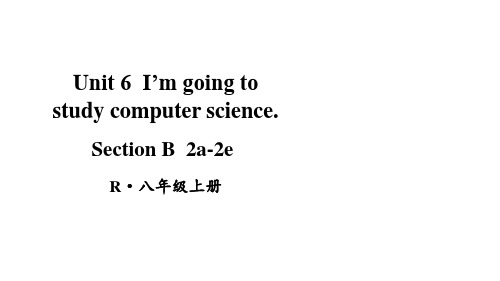
r词◆em”Pele型masb短eew语rrt。ihteehirerrpehsoonluetniounmsb.eOr tdhoewrns.
tell
=
their
family
aPnldeafsreiwenridtes daobwonuht etrhpehironweisnhuemsbaenr.d plans.
break a promise 违背诺言
tidy my roopmromwihseensbI. sgteht.=bparocmk ifsreosmth.stcohsobo. l.”) However, p承prroo诺mm某iissee人s(n某yoo事tu) t/m物o daoksetht.o yourself are resolutions,承a诺nd(t不he)m做o某st 事common kind is New
in the correct places.
A. These are about making yourself a better person. B. For example, a student may have to find more
time to study. C. There are good reasons for this. D. The start of the year is often a time for making
Para. 2
A B
How many kinds of resolutions does the writer talk about?
selfimprovement
take up a hobby
three resolutions
better planning
人教版八年级英语上册unit6阅读课课例分析

人教版英语八年级上册Unit 6阅读课课例分析摘要:以读促写是阅读课的一种重要授课方式,结合学生实际,在八年级上册的阅读课中通过教授学生如何获取文本知识达到以读促写是本节课的教学重点,通过两个课时的课例分析,将促进我在英语阅读教学中的提升。
关键词:阅读技巧信息提取以读促写一、人教版英语八年级上册Unit 6 阅读课教学反思(第一节课)本堂课是八年级上册第六单元的阅读课,在本课时中,教学重点是通过教授阅读技巧,通过与学生的互动,使他们的学习能力、语言能力、思维能力等都得到提升,教学难点是如何让学生在阅读中提取信息,完成写作任务。
阅读课的最大阻碍就是学生的词汇量问题,因此在上阅读课之前的早自习,我花了大量时间对单词、词组进行讲解,而且每个词组都会联系到本节课的内容,这样既减少了单独讲词汇的枯燥感,也让学生在课前就对重点句型有初步的把握。
这种方式可以在今后的单词教学中多多尝试。
本单元的阅读文本围绕着resolution进行展开,因此本堂课我直接以“My new year’s resolution”为导入,直接展示了核心句型“I’m going to do...”,这是文章中的关键句型,也是写作中的核心句型。
整个导入比较自然,学生通过AB部分的学习也能很快跟上教师的节奏。
在Before reading 中安排了词组自测,由于早自习进行了落实,学生提前完成了导学案,这部分完成的效果也不错,只是上课之后发现,小部分同学朗读仍然有障碍,以后在领读单词时,应该多指导小组学习,以小组为单位进行小组互助学。
Fast reading 部分通过指导学生使用scanning and skimming 寻找段落关键词,比如寻找与ABCD选项中的近义词、反义词等,让学生在初步掌握文章结构的同时完成阅读任务。
从学生的课堂表现来看,基础较好的学生能够迅速完成,并且在核对答案部分能够指导同伴。
这样的课堂效果是达到了预期的,说明学生在预习时候做的很到位,不同层次的学生在课堂上可以相互学习,也达到了自主学习、互助学习的课堂目标。
人教版初中英语-八年级上册-unit6知识点+练习

⼈教版初中英语-⼋年级上册-unit6知识点+练习初中英语题集⼋年级上 Unit6知识点⼀:词汇变形1.play – player2.drive – driver3.cook – cook (厨师)/ cooker (炊具;炉灶)4.science –scientist5.violin-violinist6.piano-pianist7.foreign-- foreigner/doc/41bc2ceb6ad97f192279168884868762cbaebbf7.html cate (v.)-- education (n.)—educational (adj.)9.send—sent—sent10.begin—beginning11.improve(v.)—improvement(n.)12.week(n.)—weekly (adv.)13.discuss(v.)—discussion(n.)14.person(n.)—personal(adj.)15.they—themselves(反⾝代词【典型例题】例题1.1.They enjoyed _________(them) at the party last night.讲透考点:考查反⾝代词。
讲透本题:根据句意,本句要表达玩得开⼼。
故短语enjoy oneself 可以表达,再根据已给的词them,所以答案:themselves.例题2.2.Age is a _______(person)problem in the West. Don’t talk about it.讲透考点:形容词的转化。
讲透本题:根据句意,年龄在西⽅是⼀个私⼈的问题,所以person 要转换为七形容词形式personal.例题3.3.At the _______ (begin) of the book, the writer told us a story.讲透考点:词性的转换讲透本题:根据本单元的短语at the beginning 可知该题答案为beginning.相似题:1.Tom is good at ___________ and he wants to be a ___________ when he grows up.(science)2. Everyone should try ___________ themselves because the ___________ is important for us.(improve)3. Student Times is a ___________newspaper. It comes out on Tuesday each ___________.(week)4. They ___________ to make a soccer team as a their New Year’s resolution at the ___________ of last year.(begin)5. I am going to ___________ with my co-workers about the plan. I really wonder what our ___________ will be like? (discuss)答案:1.science scientist 2. to improve improvement 3. weekly week4.began beginning5. discuss discussion知识点⼆:重点短语及句式句型1.be sure about 对某事有把握2.be able to 能够做.....3.in common 共同4.take up 学着做;开始做5.hardly ever ⼏乎不6.Practice doing sth 练习做某事7.Keep on doing sth 不断做某事8.Promise to do sth 答应去做某事9.have to do with关于;与有关系10.-- What do you want to be when you grow up?-- I want to be an engineer11.-- How are you going to do that?-- I’m going to study math really hard【典型例题】例题1.1. Do you want to a doctor when you're older?A. isB. areC. beD. am讲透考点:want to do/be 想做什么事或想成为…讲透本题:根据句意想成为⼀名医⽣,故答案选C.例题2.2. What are you this evening?A. going toB. going to doingC. going to doD. go to do讲透考点:⼀般将来时be going to do 的表达讲透本题:根据时间状语this evening, 该句要⽤⼀般将来时,再看选项be going to do, 故答案选C.相似题:1. Paul wants an actor because he likes acting.A. to beB. beC. becomeD. becoming2. M y sister art when she grows up because she wants to be anartist.A. studiesB. is going to studyC. studiedD. studying3. your brother a magazine from thelibrary?A. Are; going to borrowB. Is; going to borrowC. Will; borrowsD. Are; going to borrows4. --- next year?--- She is going to learn more about English.A. When is she going to learn more about EnglishB. What does she doC. What's she going to doD. Where is she going to do5. --- ?--- I am going shopping.A. What are you going to doB. When are you goingC. Where are you goingD. Who are you going with6. --- David, why are you so excited?--- My father has made a that he will take me to Tibet next month.A. faceB. promiseC. mistake7. The little girl was unable her name.A. to writeB. to writingC. writeD. writing8. --- I don't think that animals should live in zoos.--- . The animals need freedom.A. I agree with youB. I disagree with youC. I agree to youD. I disagree to you答案: 1. A 2. B 3. B 4. C 5. A 6. B 7. A 8. A知识点三:重点语法1.be going to的⽤法(1)be going to是⼀种固定结构,它后⾯要接动词原形,⽤来表⽰按计划或安排要发⽣的事情,含有be going to结构的句⼦中往往有表⽰将来的时间状语。
人教版八年级上册英语单元教案(含教材分析)--Unit 6
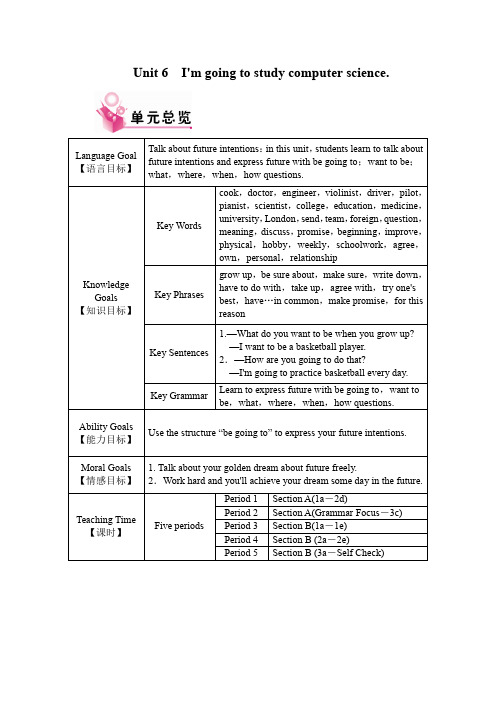
Unit 6I'm going to study computer science.Section A 1a呈现了几种不同的职业,要求学生根据趣味性为其排序。
一方面让学生复习已经学过的一些表示职业的词汇(如teacher等),同时认知一些新的表示职业的词汇(如computer programmer),为后面的各项活动作铺垫。
Section B部分以“新年的决心”为主题设计了一系列的活动:1a 要求学生将图片和相应的新年决心配对,为后面实施交际功能提供了材料;1b 引导学生通过对话巩固掌握1a 出现的生词及be going to结构;1c和1d是听力练习同时也是输出性的任务,在听力理解的基础上要求学生注意形式的正确性;1e要求学生列出一些自己的决心或计划,然后进行小组讨论;2b 是一个阅读练习,介绍了resolution(决心)的含义、类型等,任务输入和输出并重,便于巩固、应用目标语言;3b和3c是两个写作练习,培养学生用目标语言写作的能力;4 小组活动的主题是清洁与绿色,培养学生在情境中运用语言的能力,同时渗透德育教育。
第一课时Section A(1a-2d)Teaching Goals【教学目标】Key words:cook,doctor,engineer,violinist,driver,pilot,pianist,scientistKey phrases:be going to,grow up,computer programmer,computer science,bus driver,basketball player,be sure about,make sureKey sentences:1.What do you want to be when you grow up?I want to be a basketball player.2.How are you going to do that?I'm going to practice basketball every day.3.Not everyone knows what they want to be. Just make sure you try your best. Then you can be anything you want!Teaching Key Points【教学重点】The vocabulary:cook,doctor,engineer,violinist,driver,pilot,pianist,scientist,grow up,be going to,computer programmer,bus driver,basketball player,be sure about,make sureTarget language:What do you want to be when you grow up?I want to be a computer programmer. How are you going to do that?I'm going to study computer science.Teaching Difficult Points【教学难点】1. The usage of “be going to”.2. Use the target language to express your future intentions.Teaching Aids【教学工具】An English textbook,a tape recorder,CAI or courseware.Teaching Steps【教学过程】★Step 1Leading in复习一般现在时表示计划、打算做某事的用法。
人教版八年级英语上册Unit6 SectionB Reading 阅读优质课课件
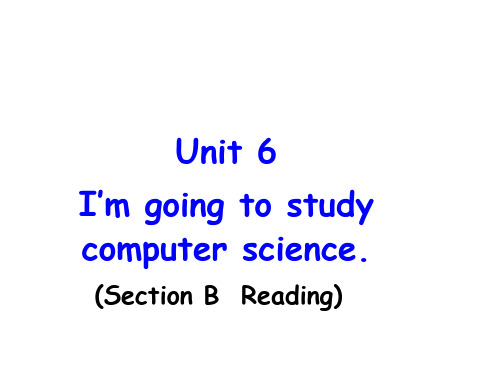
My resolution has to do with physical health. Next year, I’m going to go to bed earlier. ……
Homework
Write a short passage about your New Year’s resolutions.
have to do with: be about
Task 4: Read and underline the answers.(3’)
Para 1
Why do people usually make
resolutions? How can people remember
their resolutions?
Unit 6
I’m going to study computer science.
(Section B Reading)
What’s a resolution?
It’s a kind of promise (承诺) you make to yourself.
My resolutions are about physical health.身体健康 I want to improve my health.
…. People hardly ever keep them! ____ Sometimes the resolutions may be too difficult to keep. Sometimes …
Tip 3: Care about context (关注上下文)
Listen and check the answers. …, and the most common kind is New Year’s resolutions. D__T_h_e__s_ta_r_t__of__t_h_e_y_e_a_r_i_s_o_f_t_e_n _a__ti_m_e__f_or__m_a_k_in_g__re_s_o_lu_t_io_n_s_. When we make resolutions at the beginning of the year … …. Many resolutions have to do with selfimprovement. _A__T_h_e_se__a_r_e_a_b_o_u_t_m_a_k_i_n_g_ _y_o_u_rs_e_l_f_a__b_et_t_e_r_p_e_r_s_on_._ … Some resolutions have to do with better planning, like making a weekly plan for schoolwork. __B_F_o_r__ _e_x_am__p_le_,_a__s_tu_d_e_n_t_m__ay__h_a_v_e_t_o_f_i_n_d_m_o_r_e_ _t_im_e__t_o_s_t_ud_y_.__ …. People hardly ever keep them! _C__T_h_e_r_e_a_r_e_ _g_o_o_d_r_e_a_s_on_s__f_or__t_h_is_._ Sometimes the resolutions may be too difficult to keep. Sometimes people just forget about them. …
- 1、下载文档前请自行甄别文档内容的完整性,平台不提供额外的编辑、内容补充、找答案等附加服务。
- 2、"仅部分预览"的文档,不可在线预览部分如存在完整性等问题,可反馈申请退款(可完整预览的文档不适用该条件!)。
- 3、如文档侵犯您的权益,请联系客服反馈,我们会尽快为您处理(人工客服工作时间:9:00-18:30)。
Listen to thetapeand read each paragraph carefully then discuss the questions in groups. Learn the new words and phrases.
Step5
Post-
reading
Present the chart of the questions so that the students can retell the text easily.
Discuss thechartof questions in pairs. Try to retell the text according to the questions.
★Use“be going to”to talk about their New Year’s resolutions.
2) Teaching difficulties:
★Readthepassage andextract usefulinformation, improve the students' comprehensive reading ability
Discuss in pairs and answer the questions.
Arouse student’s interest by discussing the questions, get ready for reading.
Step4
While-
reading
A. Fast reading
Step7
Homework
1. DO 2e-3c.
2. Write a short passage about New Year’s resolutions.
Blackboard plan:
Unit6I’m going to studycomputer science
1. Let the students read the text quickly.
2. Ask: Why do you think resolutions may be difficult to keep?
3. Discuss in groups to do 2b and 2c. Check the answer.
B. Careful reading
1.Ask students tolisten tothetape and read carefully paragraph by paragraph.
2. Let them discuss and answer the questions in groups. Underline the key words in the text. Explain the new words and phrases.
★use “be going to” to talk about their New Year’s resolutions .
3) Aims of emotion: after this lesson, students will be able to:
★knowthat resolutions may be difficult to keep, but we should take more actions to make the resolutionswork.
★use “be going to” to talk about their New Year’s resolutions .
2) Aims of abilities: after this lesson, students will be able to:
★read the passage and extract useful information, improve their comprehensive reading ability
Unit6 I’m going to study computer science
(Reading)
I.Analysis of the teaching material
1. Brief introduction of the teaching material:
The teaching material which I’m going to talk about is“Unit6 I’m going to study computer science”. The lesson is about resolutions. The purpose of this lesson is to extract useful information from the text to complete the exercises, and develop the students’ basic skills of listening, speaking, reading and writing by helping them to talk about their different kinds of New Year's resolutions. Meanwhile, I think moral education should also be carried out properly.
Help the students know the main idea about the text by reading quickly. Develop students’ability of fast reading.
Help the students improve the skills of extracting useful information by reading carefully. Develop the students’ability ofcooperationby discussing in groups.
2. Learn to communicate and cooperate through interaction in the target language.
IV.Teaching aids
Multi-media, a blackboard
V. Teaching procedures:
Teaching steps
Step3
Pre-
reading
1. Tell thestudents to discuss their last year’s resolutions in pairs.
2. Ask them to discuss thequestions: Did you make any resolution last year? Were you able to keep them? Why or why not?
Improve the students’ability of listening and speaking by retelling the text.
Step6
Production
1. After reading thepassage, I knew that doing is better that saying!So, how can you keep your resolution?Just do it!
3. Teaching focus and difficulties:
1) Teaching focus:
★Master some useful words and expressions mentioned in knowledge objects.
★Read the passageand extract useful information, improve the students' comprehensive reading ability
★Use“be going to”to talk about their New Year’s resolutions.
II. Teaching methods
1. Student-centered
2. Task-based teaching
III.Learning methods
1. Group work.
Listen to the teacher and learn the new words and phrases. Take an active part in pairs and answer the questions.
Arouse student’s interest and create plots and scenes to guide the new lesson.
2. Teaching aims and demands:
1)Aims of knowledge: after this lesson, students will be able to:
★master some words and phrases such asresolution, improve, self-improvement, physical health, weekly, have to do with, make promises, have…in common, write down, for this reason, take up.
Discuss thequestions in groups. Try to say something about the resolutions.
Let the students knowdoing is better than saying.Arouse student’s interest by talking about their own New Year’s resolutions.
